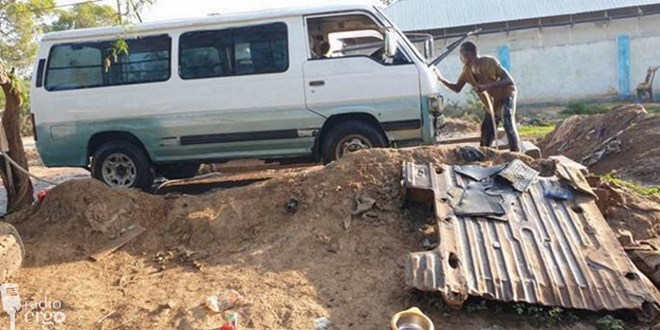
Monday November 22, 2021

Salah Haji Jimale, once a well-off farmer in Somalia’s breadbasket Middle Shabelle region, is now working in a carwash to stave off hunger for his family living in an IDP camp.
River Shabelle floods destroyed Salah’s farm and property in Mansoor village, 15 kilometres west of Mahaday Weyne town, in May. They had no choice but to flee south to Jowhar, where he settled in Tawakal IDP camp with his wife, seven children, and his two elderly parents.
“I was a wealthy man with a four-hectare farm. I used to plant sesame, beans, maize, mangos, bananas, and lemons. The floods washed away the farm and destroyed our four-roomed house. We fled with nothing but our lives. We have not even carried our beddings and utensils,” Salah told Radio Ergo.
He now works at a car wash in Jowhar, making at most 40,000 Somali shillings ($1.5). The money he earns is not enough to feed his family of 11. His wife washes clothes earning 60,000-100,000 Somali shillings ($2.3-$3.8) when she finds work, hoping to put two meals a day together for the family.
His 12-year-old daughter is also working as a housemaid for a family in Jowhar, earning $20 a month, although sometimes she does not get paid on time.
Salah is bitter at the blow he and his family have been dealt. He had taken a loan of $450 to buy seeds and inputs for his farm and was hoping to pay off the loan after harvesting.
“I never thought I would be working at a car wash in my life! I am doing this job so that my children don’t sleep hungry, otherwise this is not something I would do,” he said. “If I was alone and didn’t have children, I wouldn’t have done this job.”
Struggling to adapt to urban life, the first time he washed a client’s car he poured water on the seats, angering the car owner who refused to pay. A fellow worker appeased the client and helped clean up.
Salah misses their former life as independent farmers, living in their own house with everything they needed. Although four of his children are attending a secular school supported by NGOs who provide books and uniform, it is not the education that he wants for his children.
“Life in the IDP camp is not good at all. In the village we didn’t have a school, but my children went to madarassa. When we came here, I took three of my children to a madarassa near the camp, but I was asked to pay $3.8 monthly fee for each child. I don’t have that money, so they stopped going,” he complained.
“Here at the car wash, I don’t make money, some days I go home empty handed. This is not life! My wife goes around the villages asking the locals if they have laundry jobs. It is just like being a beggar, as sometimes people turn her away, shutting the door in her face!”
Salah asked well-wishers to help him rebuild his flood-destroyed house and pay off his debts so he can return to the village and resume his livelihood.
“I have seen what life in the town looks like. This is not a place suitable for me to live. You need to have money to lead a decent life here. I request aid organisations and Somalis of good will to support me,” he said.